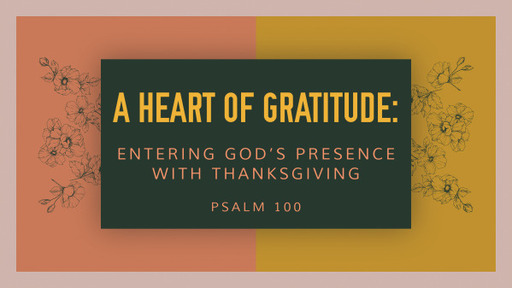A Heart of Gratitude: Entering God's Presence with Thanksgiving

Psalm 93. Psalms 29; 93; and 95–99 are hymns of praise for divine kingship, namely, God’s kingly rule over creation
When the OT speaks of the kingship of God, it can mean his kingship over all creation, or it can mean God’s acknowledged kingship over his people (1 Sam. 8:7; 12:12–15); the NT expression “kingdom of God” focuses on the way God ministers to and governs his people through the heir of David. In each case, it is important to discern which of these is primarily in view. The psalms of divine kingship especially celebrate God’s kingship over his creation.
A PSALM FOR GIVING THANKS
How to give thanks.
shout a war-cry, or alarm of battle
sound a signal for war or march
shout with religious impulse
Serve
labour, work, do work
work for another, serve him by labour
serve as subjects
Father of the fatherless and protector of widows
is God in his holy habitation.
6 God settles the solitary in a home
Come
Know
Knowing God is accepting his lordship
To know is to have firm ground underfoot, the prerequisite of praise
It is he who made us, and we are his;
we are his people, and the sheep of his pasture.
If there is no other reason why we must be thankful to God it is because he has both made us and redeemed us. No one should be more thankful to God than the sheep who are cared for by the Good Shepherd.
Regardless of what may happen to us, we are still his. Troubles inevitably will come. But it is no matter. We are his.
Sickness may come. We are his.
We may lose a job. We are his.
Suppose death should come into our immediately family. We are still his, and we will always be his.
